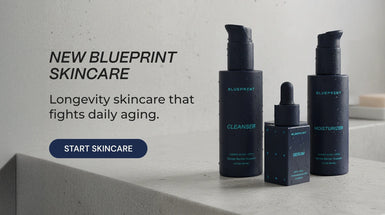Does your skin make you look older?
Written by Bryan Johnson • 10.18.2024
Skin is the largest organ of our bodies. Up until just a few years ago, I kind of destroyed mine. I regularly got sunburns, had a poor diet, and didn’t really do anything to nurture healthy skin. Now in my 40s, I'm paying the price.
When we started Blueprint, we had the goal to measure every organ of the body, including skin, and slow its speed of aging and reverse the aging damage. I had a lot of skin aging damage, and we’ve used various technologies to measure my skin age.
When I started Blueprint, my skin was in the 98th percentile for damage, with a skin age of 64. Now, my skin age has improved to between 37 and 42.
Today, I’m going to share with you my simple daily routine and the more advanced therapies I do.
Is skincare about looking good?
Skincare is important because our skin is the first line of defense against the outside world. Healthy skin protects us from infection, regulates our body temperature, and even helps us feel sensations.
Poor skin health can lead to a host of problems, from premature aging to serious health issues like skin cancer. Skin cancer can be a real and dangerous consequence of excessive sun exposure without protection. Taking care of your skin isn’t just about looking good—it’s about staying healthy. Looking your best is a great secondary benefit.
The basics
This may seem like a long list but they’re really all habits that you’ll soon forget you’re doing.
+ Get sunlight early in the mornings and later in the afternoons
+ Avoid direct sun exposure when the UV index is high (10 am - 4 pm)
+ If in the sun during high UV times, use a UV umbrella or wear a hat + mineral sunscreen
+ Prioritize your sleep
+ And eat a healthy diet
+ Avoid junk/fried/highly processed foods.
+ Consume 20-30 grams of Blueprint collagen peptides daily. It’s good to pair Vitamin C with peptides.
+ Supplements: Niacinamide (15 mg in Blueprint Essential Capsules) and hyaluronic acid (120 mg in Blueprint Longevity Mix)
My daily protocol
+ Sunscreen - (Link).
+ Creams - a few worth considering: niacinamide, vitamin C, hyaluronic acid and tretinoin (an Rx). There are seemingly endless skin cream options to choose from and my experience has been that they are only marginally helpful. If you find one that is meaningfully effective, please share!
Note: if you have your face wash or moisturizer that you like, great. The above are options.
Pro tips
+ Other UV Protection: UV-tinted windows (blocks 99% of UV) and a UV umbrella when outside.
+ Prescription: I microdose Accutane (40mg weekly) for blemish free skin and anti-aging benefits. Requires a doctor’s prescription. Alternatives include over-the-counter retinols. (Link)
+ Red Light Therapy: Three 12-minute full body sessions per week for collagen production, healing, and mitochondrial health. Note, if you don’t have easy access to red light therapy, don’t worry. The basics are a great place to start.
Measuring skin health
We measure my progress and tailor treatments with Multispectral Imaging. It provides detailed views of skin health, tracking UV damage, pore size, and spots. Reveals much more than the eyes can see. Some wellness clinics offer this service, you can search locally to find one.
Advanced Protocols
Some advanced therapies we have been experimenting with to target collagen production, skin firmness, and overall skin health.
Some examples:
+ Cream: Trialing Adipeau for facial fat for cell rejuvenation. Awaiting results.
+ Exilis: Radio frequency for collagen and tightening. Good option.
+ Tixel: Thermal mechanical ablation for improved skin firmness and collagen production. Grade: best combination of safety and efficacy.
+ IPL: Full body sessions to invite younger genetic expression. Grade: promising.
With this you’ll be off to a great start.
Bryan
Disclaimer: this blog is provided for educational and informational purposes only and does not constitute providing medical advice or professional services. The information provided should not be used for diagnosing or treating a health problem or disease, and those seeking personal medical advice should consult with a licensed physician.



![My New Skincare Protocol [2025]](http://blueprint.bryanjohnson.com/cdn/shop/articles/Updated-Skincare-Routine_173e73cb-74bb-4a3b-8edd-dc4c22addd64-8139182.webp?v=1769456624&width=450)




